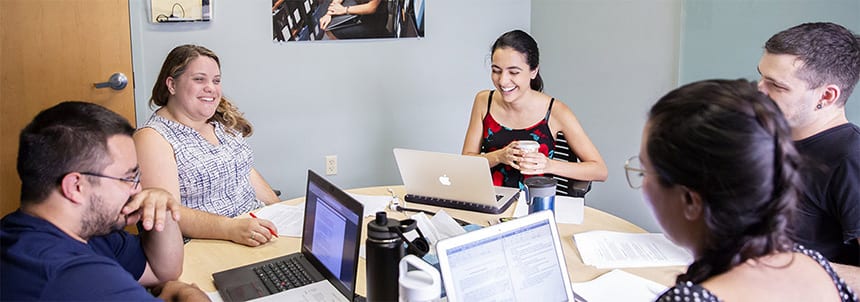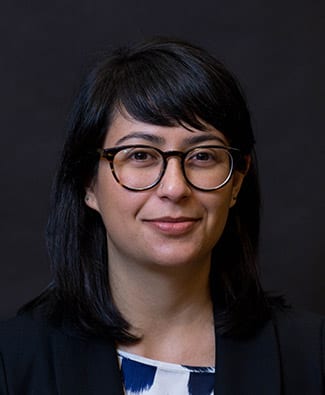
By Andrew Cohen
For two decades, the Samuelson Law, Technology & Public Policy Clinic has protected civil liberties in the digital age. But as tech-related legal dilemmas continue to snowball, the clinic is increasing its emphasis on the criminal justice system—and has hired a new clinical supervising attorney, Megan Graham, to lead this line of work.
“We’re advising public defenders on tech issues arising in their cases, and we’re pursuing tech-law reform on pervasive problems in the criminal system,” Graham says.
Just one example: overbroad digital search warrants. “The government routinely seeks access to tons of information from years before the act in question, even though there’s no clear connection between this content and the alleged crime,” Graham says. “They want to search photos, contacts, emails—everything on the phone.”
Clinic students recently helped the Legal Aid Society of New York on a project regarding search warrants for electronic devices and social media accounts. Working with Jerome Greco, who heads the organization’s digital forensics unit, Amanda Almeda ’20, Jason Francis ’21, Harrison Geron ’21, and Paymaneh Parhami ’20 drafted a memorandum that detailed current law, discussed unresolved questions, and advised how to best challenge such warrants in certain motions.
They noted that while prosecutors can readily obtain highly detailed data about a person’s life, it is far more difficult for the defense to do so—even when the information can exonerate someone.
“Their memo was excellent and addressed numerous issues including over-breadth, particularity, and the good-faith exception,” Greco says. “The students were engaged and asked important questions that demonstrated their ability to think about the issues in creative ways.”
The students also met with Greco in New York City, where he gave them a tour of his office’s digital forensics equipment and showed just how much information exists on a person’s phone—including data that most are unaware is being collected.
Leading the way
Graham relishes the opportunity to oversee the clinic’s expanding criminal justice work. While clerking for a magistrate judge in Minnesota before joining Berkeley Law, “I realized my interest in technology and surveillance law could be harnessed to provide meaningful help for public defenders.”
She was also a research fellow at the University of Minnesota Law School’s Human Rights Center, and a privacy, security, and technology fellow and assistant managing editor at Just Security. There, Graham confronted pressing issues such as law enforcement hacking, encryption, and government surveillance.
“We’re thrilled to have Megan steering our criminal justice projects,” says Samuelson Clinic Director Catherine Crump. “Technology is transforming how criminal cases are investigated and prosecuted. Criminal defense attorneys need to have the tools to access information that may help their clients, and to scrutinize the evidence being presented against them.”
In addition to tackling searches of digital devices in social media accounts and new law enforcement surveillance techniques, the clinic is examining probabilistic genotyping software. These programs analyze DNA samples in criminal cases by using black box algorithms that purportedly determine the likelihood of a suspect being a contributor to the sample.
“Problem is, we don’t know what assumptions the software makes,” Graham says. “Most samples in these instances are mixed, with more than one contributor. It’s exceedingly difficult to analyze complex samples like that, and you wind up with lower quality DNA that’s hard to pull apart.”
Building a bridge

As the clinic’s criminal justice docket expands, students are jumping at the chance to expand their knowledge base.
“My pre-law school work experience was heavily focused on intellectual property,” says Geron, a former patent scientist. “The Samuelson Clinic has broadened my horizons and brought alive many hidden passions for other areas of the law—particularly related to technology and justice—which I hadn’t spent much time thinking about before.”
Last year, Diane Aguirre-Dominguez ’20 and other students worked on a clinic project focused on prisoner-attorney emails for the National Association of Criminal Defense Lawyers. To use the federal prison email system, inmates must agree to waive attorney-client privilege in those communications—which makes corresponding with their lawyers far more difficult because it must be done in person or over the phone.
“People who interact with the criminal justice system are often some of the most vulnerable when it comes to ways that new technologies can be used to infringe on people’s rights,” Aguirre-Dominguez says. “It makes sense that the clinic is expanding into this area because there’s so much need.”
As Graham notes, “If you want to be a public defender, you need real competency about technology—in reality, it’s pervading all areas of law—and it’s great to help develop these skills in our students while also helping people who are interacting with the criminal legal system.”
No argument from Aguirre-Dominguez.
“The clinic instruction is fantastic,” she says. “I’ve learned a lot about practicing in a field that’s changing quickly and where the current state of the law doesn’t cover the problems coming up. We’re thinking about problems creatively and working to help clients find a path forward.”